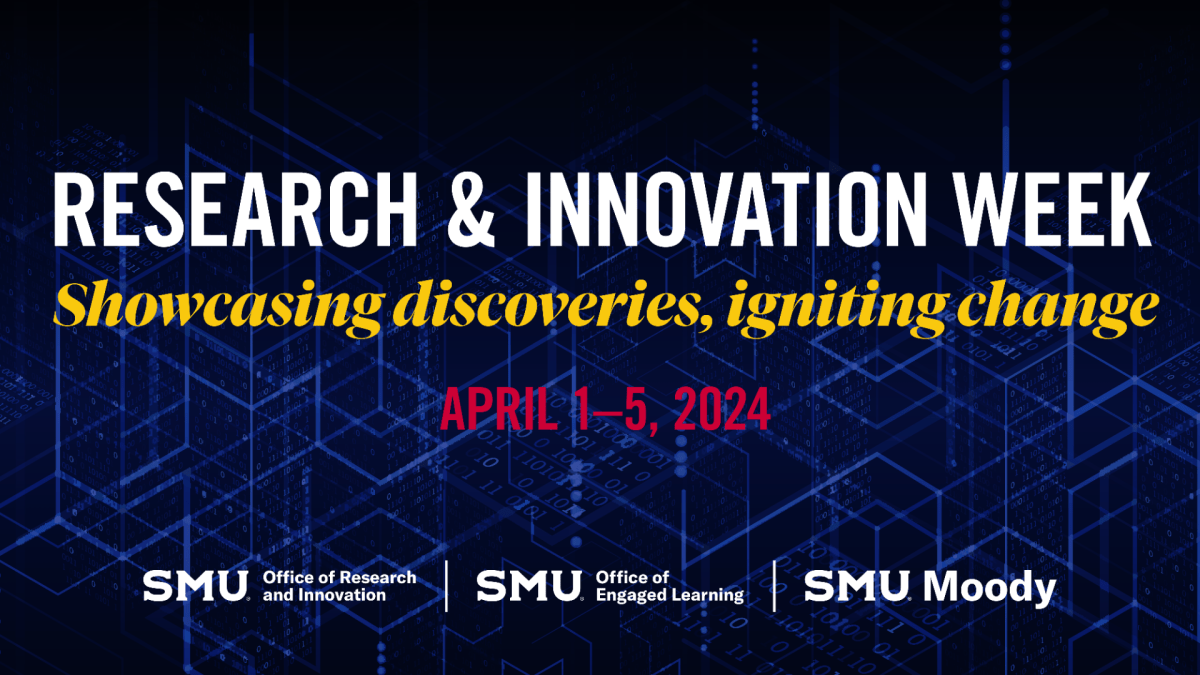SMU’s Undergraduate Poster Session for 2024 has concluded with some incredible posters and winners! The winners Elisabeth Hood, Veronica Khoury Seeling, and Gabriel Mongaras have shared with us some information about their respective posters. Read on to learn more about them!
Can you give us a layman’s terms explanation of your project?

Elisabeth: “My study investigated factors that influenced people’s attitudes and behaviors towards romantic interethnic relationships. Through surveys and interviews, we concluded that people would rather have a partner who shares their beliefs and values than have a partner who belongs to specific racial/ethnic group. This aligns with an emerging theory of interracial relationships known as dyadic cultural affinity, which places less focus on differences in the partners’ physical appearances and more focus on the compatibility of the partners’ beliefs, values, and practices.”

Veronica: “Based on researchers like Arain, we know that frontal lobe related executive function may not be fully developed until around age 25 and although the relationship between executive functioning and memory abilities has often been researched in child and older-adult populations, little research has looked to examine that relationship in college age/young adult populations. Thus, this study sought to examine the relationship between executive function and long-term episodic memory. Executive function refers to any higher order processes such as working memory, cognitive flexibility, or inhibitory control while long term episodic memory refers to the recollection of personal experiences or events. It was hypothesized that when controlling for variables like ADHD status, anxiety or depression level, age, and hours of sleep that executive function would still predict long-term episodic memory performance. After a 1 hour in lab session in which about 95 participants’ baseline executive function and long-term episodic memory performance were assessed, we took the data and ran a multiple regression controlling for those variables previously mentioned. It was found that executive function did indeed significantly predict long term episodic memory performance, suggesting that executive function is very important for general memory abilities in college age students, and future research should look towards intervention methods for those with executive dysfunction who may be struggling in school (like those with ADHD).”

Gabriel: “ChatGPT and related GPT style models have a major problem. After every word GPT generates, it has to store that word so it can reference it later. This is a problem as each word added increases the memory quadratically in term of the sequence length – that is every word increases the memory by every other word, not just itself! This becomes intractable to handle for any reasonable conversation or sequence. This problem comes from the attention mechanism, the heart of GPT models. We fix this problem by converting the softmax function to a cosine function and stabilizing the new attention mechanism, giving linear complexity while retaining the accuracy of the old softmax attention.”
How long have you worked on this project
Elisabeth: “This project began in Fall 2022!”
Veronica: “The data used for this project was taken from a larger 3-day study organized by a doctoral candidate in the MAPL lab, Diane Moon. I’ve been working on that larger project since October 2023. This particular project has been something Diane Moon and I have worked on since January/February of this year.”
Gabriel: “I have been working on this project since September of last year.”
How did you prepare, design, and print your poster?
Elisabeth: “To prepare and design my poster, I used a template provided by the Office of Engaged Learning. You can easily find these templates on the Engaged Learning website! The Engaged Learning website also has PDFs of the previous year’s winning posters, so I also used those as a guide. To print my poster, I used the FedEx on Hillcrest.”
Veronica: “This poster was prepared after countless meetings with Diane Moon and was designed with previous posters done by Diane and Dr. Bowen in mind. After I initially created the poster, Diane and Dr. Bowen looked over it two separate times before it was finally printed by the Psychology department.”
Gabriel: “Since we’ve been writing a paper, most of the information and charts came from there. However, the language had to be changed to be a little less technical. Most of the information was written around the results, algorithm and charts, which made it a lot earlier to write in less technical language, but also written like a narrative: what’s the problem, how is it fixed, what’s the results. Additionally, I tried to supply as much background information on the attention mechanism as possible with the little space I could do it in.”
What was your favorite part about presenting your poster?
Elisabeth: “My favorite part about presenting the poster was answering people’s questions! The sociology of interethnic relationships is something I’m very passionate about, and so receiving questions and being able to answer them was really inspiring; it gave me hope that this is a topic other people care about as well!”
Veronica: “Hearing how students with ADHD or other learning disabilities felt that accommodations and future interventions were very important for their success in college and that this research validated those experiences. This made me realize that this research, although small, was still important.”
Gabriel: “Meeting all the cool people with amazing projects and who were super passionate about them!”
Any tips for future presenters?
Elisabeth: “Future presenters: have confidence in yourself! Imposter syndrome is very common, especially for first-time presenters, but you know more than you think you know about your research topic. Posters are a huge feat for undergrads, so just remember that you worked so hard and you deserve to feel proud of yourself! For more practical advice, definitely get a second pair of eyes on your poster before you get it printed. Furthermore, don’t wait until the last minute to print.”
Gabriel: “Don’t be nervous about the poster presentation. It’s a lot of fun to talk about the work you’ve been doing over the past months or year(s) and most people just want to see the cool stuff you’ve been working on! Though one piece of advice is to try to think of possible loopholes or limitations in your approach as people may ask about those.”
